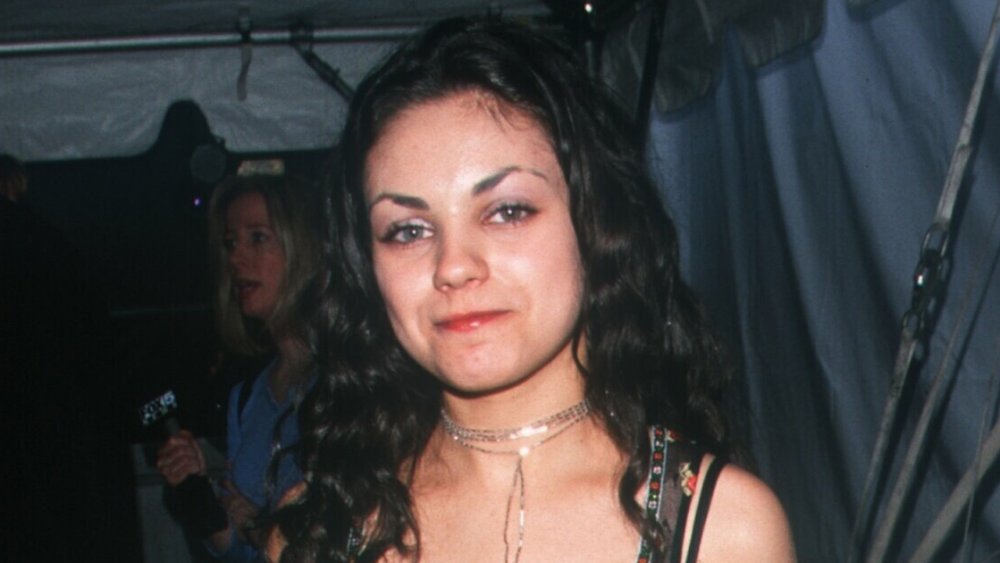The Surprising Truth About Mila Kunis' Childhood
Ever since her breakout role as Jackie Burkhart at the age of 14 on That 70s Show, Mila Kunis has consistently proven herself as a force to be reckoned with. Whether it was her dramatic critical breakthrough (and Golden Globe-nominated supporting role) in Darren Aronofsky's balletic psychological horror film Black Swan, her deadpan timing in comedies like The Spy Who Dumped Me and Forgetting Sarah Marshall, or her hilarious hijinks with husband Ashton Kutcher (remember quarantine wine?), Kunis has undoubtedly earned her place as an A-lister and pop culture mainstay.
It could be said that what makes her success in the entertainment industry even more astonishing is the fact that she came from humble beginnings — Kunis was born in Ukraine in 1983, almost eight years before the fall of the Soviet Union, to a family that was a part of a targeted class of people in the bygone era of the Eastern Bloc. However, that would be a shallow generalization involving the American Dream. If anything, the surprising truth about Kunis' childhood is that the very thing that drove her family to emigrate to the United States when she was seven years old is sadly something rife within America's sociopolitical landscape today: bigotry and rising antisemitism.
So, why did the Kunis family feel forced to flee from Soviet Ukraine, and how has that continued to impact Mila Kunis' life today?
From Ukraine, with love
Born Milena Markovna Kunis in the northern Ukrainian city of Chernivtsi in 1983, the girl who would become known to the world as Mila Kunis spent the first seven years of her life in less than ideal circumstances, per Biography. Her father, Mark, and mother, Elvira, were both well-educated and had jobs that could provide a few more means than typical — Mark as a mechanical engineer and Elvira as a physics teacher. However, Kunis' family (which also included older brother Michael) is Jewish, and was subsequently stifled by the USSR's rampant, government-mandated antisemitism.
Kunis herself has been traditionally quiet about her family's experience of antisemitism in the then-communist country. During a 2011 interview for Black Swan's promotional press junket, for example, she curtly cited "a bit of antisemitism" as a driving factor for her family's decision to emigrate to the United States before quickly moving onto another topic. But the Soviet Union's de facto antisemitic state policies at the time cannot be understated. Though Russia, along with other Eastern European countries in the surrounding region, had a long-standing legacy of virulent antisemitism before the formation of the Soviet Union in 1922, discrimination against Jewish citizens only ramped up under the rule of Joseph Stalin. This included job discrimination, lack of emigration rights, outright detainment, and worse.
Though Stalin had been long-dead by the time Kunis was born, some of these policies remained in place — and seemingly prompted the Kunis family's wish to leave Ukraine.
Mila Kunis had no idea she would move to the U.S.
Combined with the more generalized, well-known effects of oppressive rule during the existence of the Soviet Union, government-sanctioned antisemitism (which also included a prohibition on practicing Judaism in either a religious or cultural sense) ended up providing a sense of clarity for Mila Kunis' parents: when it came to finding ways to better their lives or the lives of their children, staying in Ukraine was a dead-end.
But even after making the decision to emigrate to another country, Mark and Elvira Kunis kept their plans strictly at a need-to-know basis. According to Mila Kunis herself, not even she knew they were moving to an entirely different country until they were in the middle of actually doing it. "I was told we were moving down the street," the actress recalled in a 2012 interview with the now-defunct site Moviehole, before adding that much of her childhood in the former Soviet Ukraine and Russia is fragmented and piecemeal.
The same applied during the first year of her life in the U.S. after settling into her second hometown of Los Angeles. "I blocked out second grade completely," Mila Kunis told Los Angeles Times in 2008. "I have no recollection of it ... I cried every day. I didn't understand the culture. I didn't understand the people. I didn't understand the language. My first sentence of my essay to get into college was like, 'Imagine being blind and deaf at age seven.'"
Mila Kunis' parents shielded her from prejudice during her childhood
Mila Kunis was eventually able to acclimate to American culture and find her footing as a performer at the age of nine, after her mother, Elvira, enrolled her in acting classes in order to work on the fluency of her English language skills. However, parts of her family's emigration story would only come to light decades later.
Kunis has always been candid in interviews about the struggles her parents had after settling in Los Angeles (the Kunis clan came to the U.S. with only $250 and a few suitcases, and her highly-educated parents were denied employment in their fields and forced into multiple menial jobs to make ends meet). But she only became aware as an adult of the many ways in which they shielded the antisemitism they faced back in Soviet Ukraine.
"I had no clue," Kunis told Glamour in 2016 of both the circumstances of their departure and their later struggles. "I was so well protected." While she previously recalled stories of antisemitism from her childhood friends, including antisemitic graffiti she herself witnessed, to The Sun (via the Jewish Telegraphic Agency), things became that much more clear to the star when she returned to her hometown of Chernivtsi in 2017. Opening up about the visit — during which she was purportedly barred from glimpsing her childhood home by the current occupants — Kunis told Net-A-Porter, "It was trippy. There's a part of you that wants to feel something ... I had nothing."




